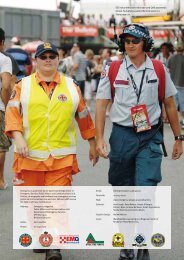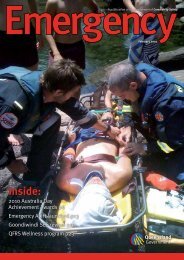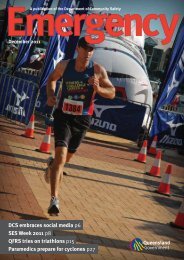Photo by Michael Marston - Department of Emergency Services ...
Photo by Michael Marston - Department of Emergency Services ...
Photo by Michael Marston - Department of Emergency Services ...
You also want an ePaper? Increase the reach of your titles
YUMPU automatically turns print PDFs into web optimized ePapers that Google loves.
Indigenous PTO course a success<br />
When the QAS introduced a<br />
customised Patient Transport<br />
Officer Course for Indigenous<br />
Australians in the Central Region,<br />
the course organisers never envisaged<br />
it would be ranked as a finalist just<br />
one year later at the Queensland<br />
Training Awards.<br />
But, such was its success, the<br />
course was named as a finalist in<br />
the Queensland Indigenous Peoples’<br />
Training Initiative Award category <strong>of</strong> the<br />
Queensland Training Awards, which<br />
were held recently.<br />
In August, the course also won a<br />
Minister’s Award for Excellence in<br />
the category <strong>of</strong> Partnership and<br />
Reconciliation.<br />
Course sponsor and QAS Strategic Staff<br />
Development Manager Rod Sheather<br />
said the program was founded on a<br />
recognition that existing recruitment<br />
and training practices were not<br />
attracting participation from<br />
Indigenous peoples.<br />
Rod said patient transport <strong>of</strong>ficers<br />
played an important role in the<br />
community, working mostly with people<br />
with chronic and debilitating illness<br />
or injuries.<br />
“Many <strong>of</strong> these patients require<br />
transport support from the QAS at<br />
regular intervals over long periods and<br />
the patient transport <strong>of</strong>ficers become<br />
a highly pr<strong>of</strong>essional constant in their<br />
lives,” he said.<br />
“In the Central Queensland Region,<br />
many clients for this service are<br />
Aboriginal and Torres Strait Islander<br />
peoples. However, less than two per<br />
cent <strong>of</strong> the QAS workforce in the region<br />
identifies as Indigenous.<br />
“To address this imbalance and<br />
improve the service to Indigenous<br />
communities, education <strong>of</strong>ficers in the<br />
QAS Central Region developed and<br />
implemented a program to recruit,<br />
train and employ a group <strong>of</strong> Aboriginal<br />
and Torres Strait Islander patient<br />
transport <strong>of</strong>ficers.”<br />
Rod said he was extremely pleased<br />
with the success <strong>of</strong> the course to date,<br />
and even more pleased with the<br />
course outcomes.<br />
“The pilot course was conducted<br />
over three months from September to<br />
December last year,” he said.<br />
“We recruited five students for the<br />
course. All <strong>of</strong> them completed the<br />
Certificate III in Non-emergency Patient<br />
Care and all participants have been<br />
employed as patient transport <strong>of</strong>ficers.<br />
Patient Transport Officer Stewart Smith, pictured with Learning Support Officer Carolyn<br />
O’Sullivan, is now training to become a Paramedic.<br />
The customised Patient Transport Officer course provides a great model for other employers<br />
who want to improve access and success for Indigenous Australians.<br />
Three participants are currently<br />
pursuing higher-level qualifications<br />
within the QAS.”<br />
Rod said he believed the project would<br />
have far-reaching effects on the way<br />
the QAS recruits, trains and supports<br />
Aboriginal and Torres Strait Islander<br />
students.<br />
“The QAS now has a proven model<br />
to recruit and train patient transport<br />
<strong>of</strong>ficers from Indigenous communities,”<br />
he said.<br />
“This model will be adapted over time<br />
to improve access and success in other<br />
QAS vocational education and training<br />
programs.<br />
“In addition, the project will provide<br />
the basis for a manual <strong>of</strong> guidelines<br />
for tailoring training for Aboriginal<br />
and Torres Strait Islander participants<br />
and this manual will be used within<br />
QAS and made available to<br />
other organisations.”<br />
Work was now underway to develop a<br />
State Indigenous Cultural Awareness<br />
Course, Rod said.<br />
“On behalf <strong>of</strong> the State Ambulance<br />
Education Committee, I am<br />
developing the course, which will<br />
be completed <strong>by</strong> all paramedics,<br />
communications <strong>of</strong>ficers and patient<br />
transport <strong>of</strong>ficers,” he said.<br />
“It aims to provide all operational<br />
staff with a level <strong>of</strong> understanding<br />
about working with Indigenous<br />
colleagues and Indigenous patients.”<br />
The next Patient Transport Officer<br />
Course for Indigenous Australians<br />
will be held in March 2007. The<br />
course will be held in Central Region<br />
with an invitation extended to<br />
participants from other regions<br />
to attend.<br />
– Hayley Gillespie<br />
2 EMERGENCY October 2006 www.emergency.qld.gov.au






